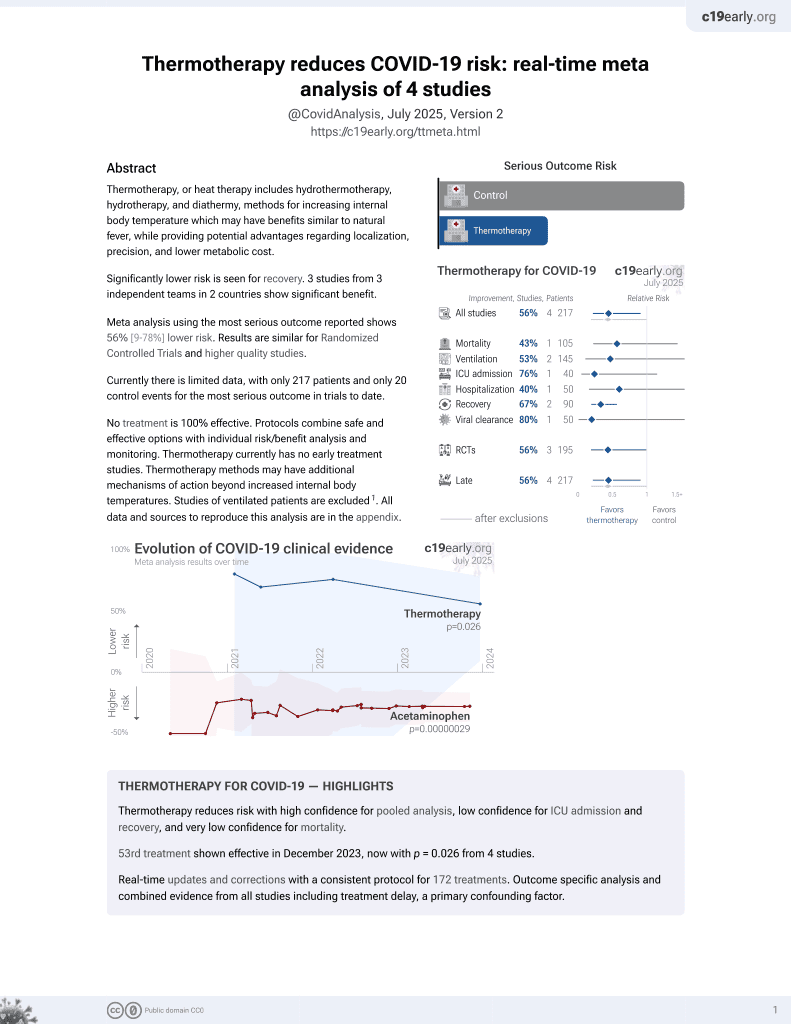Finnish sauna and COVID-19
et al., Le Infezioni in Medicina, 1, Dec 2021
54th treatment shown to reduce risk in
December 2023, now with p = 0.026 from 4 studies.
Lower risk for recovery.
No treatment is 100% effective. Protocols
combine treatments.
6,400+ studies for
210+ treatments. c19early.org
|
Review of the potential role of passive heat therapy from Finnish saunas in reducing the risk of severe COVID-19. Authors suggest that regular sauna use may reduce COVID-19 severity by enhancing immune function, reducing inflammation, and possibly mimicking the effects of fever.
1.
Smadja et al., Hyperthermia and targeting heat shock proteins: innovative approaches for neurodegenerative disorders and Long COVID, Frontiers in Neuroscience, doi:10.3389/fnins.2025.1475376.
2.
Kunutsor et al., Finnish sauna and COVID-19, Le Infezioni in Medicina, 1, www.infezmed.it/index.php/article?Anno=2021&numero=1&ArticoloDaVisualizzare=Vol_29_1_2021_160.
3.
Ramirez et al., Hydrothermotherapy in prevention and treatment of mild to moderate cases of COVID-19, Medical Hypotheses, doi:10.1016/j.mehy.2020.110363.
4.
Mancilla-Galindo et al., Exploring the rationale for thermotherapy in COVID-19, International Journal of Hyperthermia, doi:10.1080/02656736.2021.1883127.
5.
Larenas-Linnemann et al., Enhancing innate immunity against virus in times of COVID-19: Trying to untangle facts from fictions, World Allergy Organization Journal, doi:10.1016/j.waojou.2020.100476.
Kunutsor et al., 31 Dec 2021, peer-reviewed, 3 authors.
Abstract: Le Infezioni in Medicina, n. 1, 160-162, 2021
160 LETTERS TO THE EDITOR
Finnish sauna and COVID-19
Setor K. Kunutsor1,2, Carl J. Lavie3, Jari A. Laukkanen4,5,6
National Institute for Health Research Bristol Biomedical Research Centre, University Hospitals Bristol
and Weston NHS Foundation Trust and the University of Bristol, Bristol, UK;
2
Musculoskeletal Research Unit, Translational Health Sciences, Bristol Medical School, University of Bristol,
Learning & Research Building (Level 1), Southmead Hospital, Bristol, UK;
3
John Ochsner Heart and Vascular Institute, Ochsner Clinical School-the University of Queensland School
of Medicine, New Orleans, Louisiana, USA;
4
Institute of Public Health and Clinical Nutrition, University of Eastern Finland, Kuopio, Finland;
5
Institute of Clinical Medicine, Department of Medicine, University of Eastern Finland, Kuopio, Finland;
6
Central Finland Health Care District Hospital District, Department of Medicine, Jyväskylä, Finland District,
Jyväskylä, Finland
1
Dear Editor
Over the last 11 months, coronavirus disease 2019
(COVID-19) -caused by Severe Acute Respiratory
Syndrome Coronavirus 2, SARS CoV-2- has had
devastating effects on the world, with substantial
morbidity and mortality. In a desperate search
to find effective preventive and curative therapies for COVID-19, several recommendations
entered the spotlight. Some preventive measures
that were proposed included vitamins D and C
supplementation, given their ability to enhance
innate immunity [1, 2]. There have been anecdotal reports that exposing oneself to high temperatures can prevent COVID-19. During the summer,
many countries witnessed a decrease in transmission of COVID-19 as well as decreases in severe
illness and deaths associated with the disease.
This letter was driven by the fact that our research group has been inundated with numerous
enquiries on whether heat exposure from saunas
may be effective in combating COVID-19. Our
primary research focus has been the role of passive heat therapy (using Finnish sauna) in the
prevention of cardiovascular disease (CVD) and
other non-communicable diseases [3]. Evidence
suggests that high temperatures can reduce the
transmission of influenza and the Severe Acute
Respiratory Syndrome (SARS) viruses, as well as
COVID-19 virus [4-6].
SARS-CoV-2 is the seventh member of the family
Corresponding author
Setor K. Kunutsor
E-mail address: skk31@cantab.net
of coronaviruses that infect humans. The coronaviruses are enveloped viruses which can remain
active in cool dry conditions, but are destroyed
by temperatures tolerable to humans; it has been
shown that temperatures ranging from 60 to 80°C
for 30 to 1 min duration, respectively, could inactivate the coronaviruses [7].
In a study that evaluated the stability of the virus
in different environmental conditions, Chin and
colleagues demonstrated that SARS-CoV-2 was
highly stable at 4°C, but sensitive to heat [8]. In
virus media incubated for 14 days, infectivity of
the virus was still high at a temperature of 4°C on
day 14, whereas when the incubation temperature
was increased to 70°C, the virus was inactivated
within 5 mins. In a multicity study conducted in
China to determine the impact of meteorological
factors on COVID-19 transmission, it was observed that weather conditions associated with
low temperature, mild diurnal temperature range
and low humidity, were more likely to favour the
transmission of COVID-19 [4].
Passive heat therapy is..
